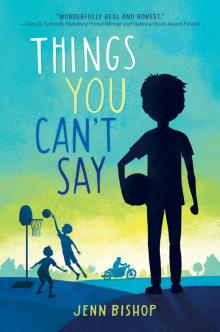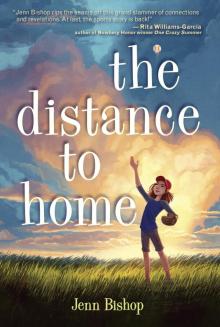- Home
- Jenn Bishop
Things You Can't Say
Things You Can't Say Read online
Praise for THINGS YOU CAN’T SAY
“As Things You Can’t Say shows the gaping fissures that loss and grief can cause in a kiddo’s life, so too does it show how those same fissures may begin to heal and close. That we are rooting so hard for their closing in Andrew’s life is a measure of how wonderfully real and honest this story is, and of how deep our need is for just the right words.”
—GARY D. SCHMIDT, Newbery Honor winner and National Book Award finalist
“With grit and authenticity, Bishop takes us inside the head and heart of a young boy. Be prepared to laugh, cry, cheer, and turn the last page with a satisfying sigh.”
—BARBARA O’CONNOR, author of Wonderland
“This touching, authentic novel will open readers’ eyes and hearts about mental health issues in loving, ‘normal’ families. Jenn Bishop explores a challenging subject with sensitivity and grace.”
—BARBARA DEE, author of Maybe He Just Likes You
“People who go away forever. People who come out of nowhere. People who drift away and then drift back. Three years after the death of his father, young Drew finds a way to make peace with all these sorts of people. An emotional tale of a boy who finds it takes equal measures of courage to move forward and to look back.”
—PAUL MOSIER, author of Echo’s Sister
FOR MY LIBRARY TEENS—FROM MALDEN, CONCORD, CARLISLE, AND HOMEWOOD.
AND FOR AUTUMN, WHO BELIEVED IN THIS STORY FROM THE BEGINNING.
1
EVERYONE’S GOT A FAVORITE COLOR. A favorite book, band, movie. But what about a favorite sound? For me, that’s the easiest: little kids laughing. A four-year-old absolutely losing it because of something funny I just said? No better sound in the universe.
That’s the thing about little kids. They don’t know how to fake it yet. There’s nothing they’re hiding beneath the surface. No tricks, no secrets.
I’ve got my head ducked down below the library’s puppet stage in the corner of the children’s room, right by the new picture books, and I’m using my very best performer voice. “Zombie Goldilocks thought Papa Bear’s bowl of brains was too hot.” With my right hand, I make the zombified Goldilocks puppet spit out brains in every direction. “Pttew. Pttew.”
The little kids giggle. One of them maybe even snorts.
“But Mama Bear’s bowl of brains was too …” I wait for one of the kids to chime in.
“Stinky!” a girl in the front yells out—I think it’s Claire, but I can’t tell for sure with my head ducked down. The other kids around her laugh and laugh.
I stick my head up for a second and catch the children’s librarian, Mrs. Eisenberg, smiling in her rocking chair, just past the rainbow rug the kids are sitting on.
“Her brains were too stinky. Pee-yew! But then Goldilocks found Baby Bear’s bowl of brains, and it was …”
“Just! Right!” they yell out together.
Smiling makes it hard for me to do this voice, so I try super hard to keep a straight face.
Now, it’s one thing to zombify Xander’s bedtime stories. Of course my brother’s going to find it funny. But I didn’t know how well it’d work for other kids until that time last summer when Mrs. Eisenberg asked me to fill in for her. But afterward she said that if I wanted, I could do it more often. She said it showed ingenuity. Whatever. All I know is it makes the kids laugh. And that it’s the kind of thing Dad used to do for me when I was little. Of course he was good at telling stories. Wasn’t that what he was doing the whole time? Our whole lives a big fairy tale, him pretending everything was perfect—fine—when obviously it wasn’t.
There. Now the smile is gone.
“When Papa Bear came home, he saw the empty bowl. ‘Now, who ate my brains?’ ”
I peek again and catch Demaris in the front row, picking his nose. I push Papa Bear out like he’s going to leap off the stage. “Was it you, Demaris?”
Demaris’s finger flies out of his nostril so fast. “Noooooo!” He giggles.
“Was it … Abigail?”
Shy Abigail’s lips are zipped.
“It was you, wasn’t it? It’s always the quiet ones. I’m onto you.”
For the past two weeks, I’ve been trying different ways to get her to participate, but each time, no dice. Come on, Abigail.
“Nah,” I say. “You’re right. You’re not a fan of brains. Your favorite food is probably more like … hmm … boogers?”
“No, it’s not,” Abigail says. “It’s pizza!”
“Well then, who on earth came in here and ate all my brains?”
The kids crack up. For a second, I sort of feel for the dude. If someone barged into my house and ate all my favorite food, I’d probably be annoyed like Papa Bear too.
As I’m finishing up with “Zombie Goldilocks,” Mrs. Eisenberg mouths that she’s heading upstairs. I nod to show her I have things under control down here and reach for the Little Red Riding Hood puppet that I turned into a vampire.
“Once upon a time, there was a liiiittle vampire …” The kids stop fidgeting the second I show them Little Red with her painted-on fangs.
* * *
By the time I’m wrapping up the story, all the moms and dads and babysitters have come down with their coffees and warm cookies from the new café upstairs, ready to take their kids home for naps and lunch. I’m picking up half-scribbled-on coloring sheets left on the tables when all of a sudden I catch something out of the corner of my eye. A girl. She’s about my age, with short blond hair that ends at her chin and bright red glasses. She’s sitting at one of the tables. When’d she come down here?
I walk over to her. “If you’re looking for the teen room, it’s upstairs. You take a right past the café and it’s—”
“I’m not looking for the teen room,” she says. Her voice is quiet and it’s only when she opens her mouth that I notice how frowny it is.
I glance back at the puppet stage. Did she come in while I was doing the show? Wait—tell me she wasn’t listening when I did that insane grandma voice in Vampire Little Red Riding Hood? I’m half-ready to dart behind the puppet stage and never come out again.
The best part about the children’s room is that no one my age ever comes down here. Not since they put in the teen room upstairs and the café across from it. Down here I’m safe.
Just then the elevator door opens and out comes Mrs. Eisenberg holding a large stack of cardboard boxes that looks like it’s about to topple over. I hustle to help her before the boxes fall to the ground.
“Thanks, Drew. Always coming to my rescue.” Mrs. Eisenberg beams at me.
As we’re putting the boxes down next to her desk, Mrs. Eisenberg spies the girl who overheard my whole story-hour routine. “Oh my gosh!” She laughs. “You startled me. Audrey, right?”
The girl—Audrey, I guess—nods.
“I almost forgot all about you, Miss Audrey. I see you’ve met our Drew. He’s been helping me out in the library for the past three summers now.”
Audrey gives me a funny stare and it’s like I can read her mind. I know what she’s thinking—there’s got to be something seriously wrong with a twelve-year-old boy who chooses to hang out in the library’s children’s room all summer.
“Audrey’s going to be working with you this summer, Drew. Her family just moved to town and her mother’s up in circulation. Janet, isn’t it?”
“Yup.”
I don’t care who Audrey’s mother is upstairs. I need to rewind to hear what Mrs. Eisenberg just said. Someone else my age? Working down here? With me? For the whole summer?
“Drew, can you show Audrey how to cut out name tags so we can get ahead for the rest of the week?”
“Suuuure.”
Audrey shuffles behind
me as I point out where Mrs. Eisenberg keeps all the different colors of construction paper, plus the stencils and scissors, and where she taped up a chart showing which name tags go with which theme for story hour.
“That all make sense?” I ask.
“It’s cutting out name tags,” she mutters. “Not exactly rocket science.” Under her breath she adds, “I can’t believe they stuck me in the children’s room.”
What I want to say is, no, of course it’s not the best part of helping out in the children’s room. But sometimes when the little kids have been screaming their heads off all morning and you get a few minutes of peace and quiet, it’s kind of nice just to sit and cut. It’s easy. You can’t mess it up.
But I can’t say any of that, and definitely not to someone I barely know who doesn’t exactly seem to have a great attitude, so I just shrug, grab the yellow paper and the sun stencils, and walk back over to the table where we’ll be working together until lunchtime.
A woman pushing a fussy red-faced baby in a stroller steps off the elevator.
Audrey sits down at the far side of the table from me, eyeing the baby suspiciously.
Normally I’d say hi to the mom and wave at the baby, but it feels weird to do any of those things with Audrey here. Almost like I’m being watched.
Eventually the lady grabs a few picture books and leaves just as the baby starts wailing, and for a few minutes, we snip-snip-snip in the quiet. Mrs. Eisenberg softly flips through the pages of one of her library magazines. The loudest sounds are the hum of the aquarium and that one light above the astronomy books that always buzzes even though the janitor keeps saying he’s going to fix it.
Until Audrey starts sighing—each time she cuts out a sun, she clicks on her phone to check the time. Sigh. Yawn. Click. Sigh. Yawn. Click.
If her goal is to see how slowly time can pass, she certainly figured out a solid method.
Tap-tap-tappity-tap. Mrs. Eisenberg starts typing on her computer, then groans. “Not again.”
Across from me, Audrey perks up. She sets the scissors down on the table and jogs over to Mrs. Eisenberg. “Do you need some help?”
“Any chance you’re good with computers?” Mrs. Eisenberg chuckles.
“I started the robotics club at my last school.” Audrey takes over Mrs. Eisenberg’s seat. “I think you can say I’m good with computers.”
Click-click-clickety. “Oh man. Your browsers are really out of date. Does this thing freeze all the time?”
“Depends on your definition of ‘all the time.’ I keep asking our IT lady—Ellie—to come take a look at things down here, but I’ve got to be honest with you, Audrey, we’re all working on ancient machines. Upstairs, downstairs, you name it. There’s just no money in the budget to replace them.”
“You don’t need money to update your browsers. I mean, yeah, you can get nice machines with money. But I can help you upgrade a lot of this without it costing anything.”
“You can?” Mrs. Eisenberg glances back at me and I accidentally drop my scissors. “Isn’t this great, Drew?”
I fumble for them and start to cut again. “Yeah,” I mutter. “Great.”
Mrs. Eisenberg leans over Audrey, following whatever she’s doing. Or more likely trying to follow.
Who does Audrey think she is, anyway? Does she really think she’s going to fix all the library’s computers? She’s twelve. Or thirteen? Actually, I don’t know how old she is. But I do know how the library works, or at least how it used to work.
There are some things I don’t get to do. Like putting away all the books. That’s the job for the teens—the pages. I only get to do those things if they’re out sick and the librarians really need help. And the computers? That’s Ellie’s job. You can’t just come in here and take someone else’s job. It doesn’t work like that. Even if you’re—especially if you’re—just a kid.
“Audrey, this is amazing! We didn’t know what we were missing down here. You’re going to be a really wonderful addition to our team, you know that?”
Audrey gives Mrs. Eisenberg back her chair. I glance down at my cutting and realize I’ve totally butchered my sun. I crinkle it up and toss it in a nearby garbage can. It misses.
When Audrey sits back down at the table across from me, there’s this new smile on her face. She doesn’t even reach out to her phone to check the time again, just grabs a new sheet of paper and starts tracing.
Snip, snip, snip.
Clickety-click-clack.
A few minutes later Mrs. Eisenberg comes over to our table. When I look up, Audrey’s got her suns placed in perfectly neat little piles. Wait a sec. How’d she finish almost twice as many as me?
“Looking good! You know, Audrey, I was just thinking how a lot of parents have been inquiring about STEM programs for the little ones, but I don’t have a clue where to start. Is that something you’d want to help me with?”
For the little ones. She doesn’t mean in place of story hour. Wait, does she?
“That sounds fun,” Audrey says. “Just the planning, though … right?”
Mrs. Eisenberg beams. “Fantastic. It’ll take some time to get it off the ground. Well, I should probably take advantage of the quiet right now and pop upstairs for a bit. You two holler if it gets too crazy or send one of the pages up for me.” Sometimes I forget they’re even down here. The teens who pick the requested books off the shelf or reshelve the returns are so quiet—honestly almost ninjalike sometimes. Plus, they’re always wearing headphones.
I glance at Audrey, who’s somehow managed to churn out perfect suns even while talking, like she’s some kind of multitasking machine. Jaw clenched, I start tracing again.
* * *
By the time the church bells across the street ring for noon, I’m shooting out of my chair and over to Mrs. Eisenberg, asking if I can take an early lunch. I grab my sandwich from the staff fridge and use the last seventy-five cents in my wallet to get a candy bar from the vending machine.
If I’m going to have to suffer through an entire afternoon of Audrey trying to show me up, I need some sugar, stat.
Upstairs, I pass by Mom at the reference desk and give her a little wave, but she’s busy with Mrs. Kaminsky from down the street and barely able to wave back.
Once I’m outside, I settle onto my favorite bench under the tree. Half in the shade, half in the sun. No Audrey. No screaming babies. It’s so perfect I’m almost suspicious. I bite into the Snickers—my favorite—and let the chocolate and peanuts quiet my rumbling stomach.
Audrey rounds the corner, earbuds in. I stop chewing. If I stay as still as possible, maybe she won’t see me. She sits with her back against the brick library wall, her head drooping forward as she pulls a book out of her bag.
In the clear!
I return to chewing. Maybe the smart thing would be to run away—scram while she’s deep into her book. But I can’t let her take over all my spaces. Not that quickly. I’ve got to stand my ground somewhere.
Audrey sniffles.
No. Please. Don’t cry. Don’t cry. Don’t.
Oh no. She is. She’s crying. Her hands shoot up and cover her face, but it’s happening. It’s happening and I’m right here and now I definitely can’t run away. You can’t run away from a crying person. She swipes a hand under her nose and then—spotted.
“What?” Her lip quivers as she shoots me—me—a withering stare. What exactly did I do wrong here?
I hold up the candy bar. “Do you want a piece?”
Audrey scoffs, “Of the candy bar that you’ve already taken a bite out of?”
I sigh. Why did I for one second think it was a good idea to offer in the first place? “I was gonna break a piece off the other side, but fine, if you want to say no to free chocolate, that’s—”
“Fine. Sorry. I—” Audrey exhales. “I guess I’ll have a bite.”
I rip off a chunk from the other side and hand it to her, still in the wrapper so it’s free of Drew germs.
I�
��m not even sure why I’m doing it. Actually, that’s not true. I know exactly why I’m doing it: because it’s the kind of thing my dad used to do. He said a little bit of chocolate always made people feel better. Not exactly what you’d expect to hear from a dentist, right?
A piece of chocolate goes down the wrong way, and I need to sip some water to keep myself from coughing.
Audrey chews quietly while I get my coughing fit under control. “Did you ever have to move?” she asks.
I shake my head.
“You’re lucky, then. I’ve had to move five thousand times, and each time it sucks more than the last.”
I take another bite of the Snickers. “Why do you have to move all the time?”
“My dad’s a physicist. He got this new job at Brown, which, supposedly”—she crosses her fingers—“is the job he’ll have for the rest of his life. If he gets tenure. But that’s what they said about his last job, so who knows.”
“Where’d you live before?”
“Let me see.” She counts on her fingers. “Palo Alto. Santiago, Chile. Austin, Texas. Chicago. Pasadena. And now here.”
“Five thousand, huh?” I joke.
Audrey sticks her tongue out the side of her mouth. There’s a little bit of melted chocolate on it. “Whatever. At least your dad stays in one place.”
She hit that one right on the nose.
“What’s your dad do, anyway, that makes your family have to live in Rhode Island?” She says it as if there are rats and cockroaches swarming all around us. It’s the ocean state, Audrey. Not the sewage state. Sheesh.
The truth catches in my throat, like it has for the past three years. That Dad doesn’t do anything anymore. He stopped being anything at all—my father, a Little League coach, a storyteller, a dentist, everything—when he killed himself. “He’s a dentist.”
“And he lets you eat candy bars for lunch?”
She doesn’t notice my lie. Skips right over it. Maybe I’ve gotten so good at pretending everything’s okay now that I fool her, too.
“I have a sandwich!” I raise the plastic baggie up in the air.

 Things You Can't Say
Things You Can't Say Where We Used to Roam
Where We Used to Roam 14 Hollow Road
14 Hollow Road The Distance to Home
The Distance to Home